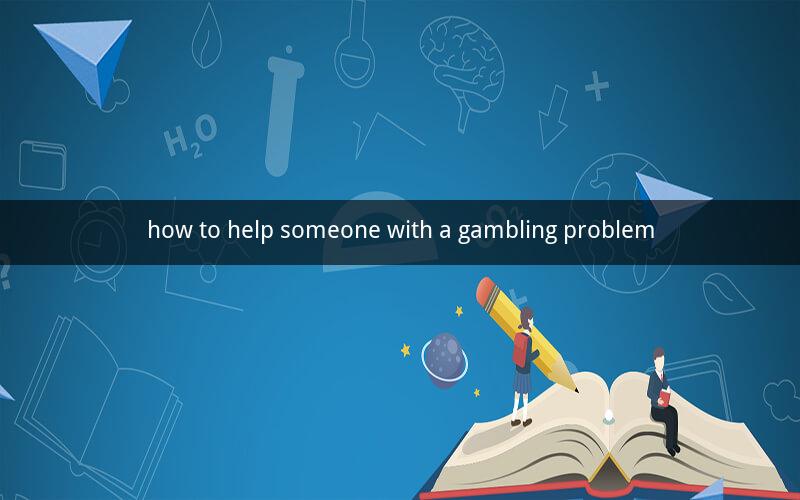
Table of Contents
1. Understanding the Problem
2. Identifying a Gambling Problem
3. Communicating with the Gambler
4. Encouraging Professional Help
5. Supporting the Gambler's Recovery
6. Setting Boundaries
7. Providing Resources
8. Educating Yourself
9. Coping with Relapse
10. Maintaining a Supportive Environment
1. Understanding the Problem
Gambling addiction is a complex issue that affects individuals from all walks of life. It is characterized by an inability to control gambling behavior, despite negative consequences. Understanding the nature of this problem is crucial for anyone looking to help someone with a gambling addiction.
2. Identifying a Gambling Problem
Recognizing the signs of a gambling problem is the first step in providing support. Look for the following indicators:
- Secretive behavior
- Financial difficulties
- Borrowing money
- Missing work or school
- Isolation
- Denial
3. Communicating with the Gambler
Open and honest communication is essential when helping someone with a gambling problem. Approach the conversation with empathy and without judgment. Here are some tips for effective communication:
- Choose a private and quiet setting
- Use "I" statements to express your concerns
- Listen actively and without interrupting
- Avoid confrontational language
4. Encouraging Professional Help
Professional help is often necessary for overcoming a gambling addiction. Encourage the individual to seek support from a therapist, counselor, or support group. Here are some resources to consider:
- Gamblers Anonymous
- National Council on Problem Gambling
- Therapy and counseling services
5. Supporting the Gambler's Recovery
Supporting the gambler's recovery journey is crucial. Here are some ways to provide support:
- Attend support group meetings with the individual
- Encourage healthy habits and activities
- Offer to help with financial issues
- Be patient and understanding
6. Setting Boundaries
Setting boundaries is important to protect yourself and the gambler. Here are some tips for setting boundaries:
- Limit financial support
- Avoid enabling behaviors
- Communicate your concerns clearly
- Seek support for yourself
7. Providing Resources
Providing resources can help the individual find the support they need. Here are some resources to consider:
- Books and articles on gambling addiction
- Online support groups
- Therapy and counseling services
8. Educating Yourself
Educating yourself on gambling addiction can help you better understand the problem and provide effective support. Here are some resources to consider:
- National Council on Problem Gambling
- Gamblers Anonymous
- Therapy and counseling services
9. Coping with Relapse
Relapse is a common part of the recovery process. Here are some tips for coping with relapse:
- Remain supportive and non-judgmental
- Encourage the individual to seek professional help
- Understand that relapse is a part of recovery
- Maintain your own well-being
10. Maintaining a Supportive Environment
Creating a supportive environment is crucial for the individual's recovery. Here are some ways to maintain a supportive environment:
- Encourage healthy habits and activities
- Avoid enabling behaviors
- Communicate your concerns clearly
- Seek support for yourself
Questions and Answers
1. What are the signs of a gambling problem?
- Secretive behavior, financial difficulties, borrowing money, missing work or school, isolation, and denial.
2. How can I communicate with someone who has a gambling problem?
- Choose a private and quiet setting, use "I" statements, listen actively, and avoid confrontational language.
3. What resources are available for someone with a gambling problem?
- Gamblers Anonymous, National Council on Problem Gambling, therapy and counseling services.
4. How can I support someone in recovery from a gambling addiction?
- Attend support group meetings, encourage healthy habits, offer financial assistance, and be patient.
5. What are some ways to set boundaries when helping someone with a gambling problem?
- Limit financial support, avoid enabling behaviors, communicate concerns clearly, and seek support for yourself.
6. How can I educate myself on gambling addiction?
- National Council on Problem Gambling, Gamblers Anonymous, therapy and counseling services.
7. What should I do if the individual relapses?
- Remain supportive and non-judgmental, encourage professional help, understand that relapse is a part of recovery, and maintain your own well-being.
8. How can I maintain a supportive environment for someone in recovery?
- Encourage healthy habits, avoid enabling behaviors, communicate concerns clearly, and seek support for yourself.
9. What are some resources for individuals with a gambling problem?
- Books and articles on gambling addiction, online support groups, therapy and counseling services.
10. How can I help myself when supporting someone with a gambling problem?
- Seek support for yourself, maintain healthy boundaries, and prioritize your own well-being.